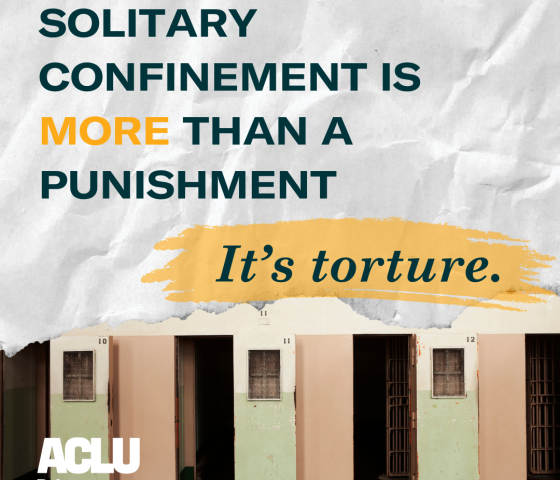The following statement is attributable to Dwayne Bensing, ACLU of Delaware Legal Director:
The new report released by the Disabilities Law Program of Community Legal Aid Society, Inc. (CLASI), shows that Delaware must take steps to end the practice of solitary confinement and ensure all people with mental illness in the state prison system are treated humanely. The report follows several months of experts speaking directly to incarcerated people, reviewing information from the Delaware Department of Correction (DOC), and conducting site visits at Delaware’s prisons to see how people with mental illnesses were treated.
Solitary confinement is a cruel punishment for any person—a form of torture with negative health effects and risks that rise by the day, according to many health experts and human rights’ advocates—but people living with mental illness are at an especially high risk of intense suffering. While the Department of Correction has made progress from when the ACLU of Delaware and CLASI filed litigation nearly ten years ago, people living with mental illness are still being subjected to isolation that is detrimental to their health and wellbeing.
In its report, CLASI pointed to several reforms needed, including:
- Ending “backdoor” methods that hold people in restrictive settings for long periods of time without formally calling it solitary confinement.
- Increasing availability of mental health and addiction services in all prisons including Residential Treatment Units and step-down services.
- Rejecting outdated and harmful tactics, such as housing people on suicide watch in strict and punitive isolation, engaging K-9 units to assault and terrify those held in solitary units, and utilizing the inhumane practice of “food loafs” in lieu of nutritious meals.
- Increasing transparency by regularly providing documentation to the public so all may understand how incarcerated people are treated and whether DOC is abiding by its legal obligations.
State representative Eric Morrison has pledged to introduce legislation in the next General Assembly to implement these reforms and ban the practice of solitary confinement altogether.
The following can be attributed to State Representative Eric Morrison (D-Glasgow):
Medical experts, psychologists, advocates, incarcerated people and their families, and prison officials across the nation have spoken out against solitary confinement as harmful and counterproductive to the health and rehabilitation of all incarcerated people. Because solitary confinement severely damages the mental health of incarcerated people, it creates a more hostile environment in prisons—placing incarcerated people and prison workers at increased risk of physical harm.
Banning solitary confinement altogether and strengthening the availability of mental health services and accountability of prison officials will ensure people living with mental illness in Delaware correctional facilities are provided the resources they need instead of punishment that will leave lasting mental and physical scars, and that incarcerated people and prison workers are less likely to experience physical harm.

